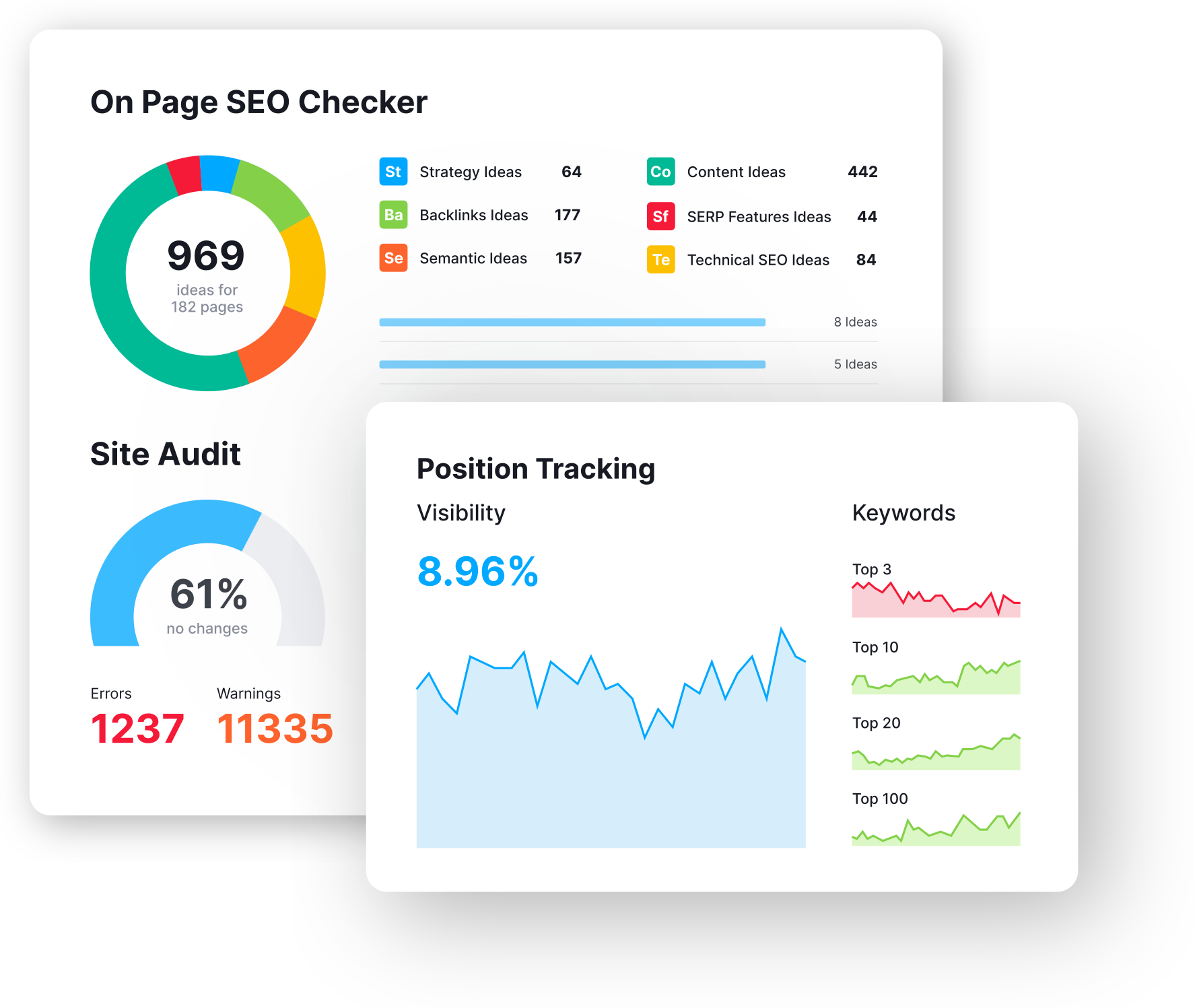

Believe it or not, the way you interact with a website can greatly influence how search engines view it. Factors like the amount of time you spend on a site, the pages you visit, and the number of pages you view can all play a role in determining the site's perceived value.
Think about it: if you quickly leave a website, search engines might assume that it doesn't provide valuable information and lower its ranking. But if you stick around for a while and explore multiple pages, search engines might see it as a high-quality site and boost its ranking.
While user behaviour is just one of many factors that search engines take into consideration, it's important for website owners to prioritise a positive user experience and encourage engagement in order to achieve higher search engine rankings. Let's work together to create a website that users love and search engines can't resist.
Using the right keywords is essential for effective SEO, but overusing them can actually harm your ranking. Search engines consider the practice of keyword stuffing, or cramming too many keywords into a single piece of content, as spammy.
When search engines detect keyword stuffing, they may penalise the website by reducing its ranking or even removing it from search results. To strike the right balance, it's important to use a few relevant keywords and integrate them into the content in a way that's natural and valuable for users.
By avoiding keyword stuffing and focusing on creating high-quality content, your website can build a strong reputation with search engines, leading to higher rankings and more traffic.
The structure of a website's URLs is a critical aspect of SEO that can make or break its ranking. Search engines rely on URLs to determine the organisation and hierarchy of a site, and this can significantly affect how they perceive the relevance and importance of each page.
As experienced SEO professionals, we have seen how descriptive, concise URLs that accurately reflect the content of a page can help search engines understand the page's subject matter and improve its ranking. On the other hand, long, complicated URLs with multiple parameters can confuse search engines and lead to lower rankings.
Consistency is also key when it comes to URL structures. By using consistent URL formats across a website, search engines can understand the relationships between different pages and increase the site's overall ranking. To further enhance the readability of URLs, we recommend using hyphens to separate words, as search engines favour this format.
As passionate SEO experts, we know that paying attention to the structure of a website's URLs can significantly improve its SEO ranking and increase its visibility in search results. By implementing best practices in URL structure, website owners can make their pages more accessible and engaging for both search engines and users alike.
In the world of SEO, social media signals have long been a hot topic of discussion. While there is no clear-cut answer as to whether social media activity, like shares, likes, and followers, directly impacts a website's search engine ranking, there's no doubt that it indirectly influences it.
Think about it: if a website's content is widely shared and discussed on social media, it's only natural that it gains more visibility and authority, and that can be good for its search engine ranking. Moreover, social media provides a great opportunity to build backlinks to a website, which are one of the ranking factors used by search engines.
So while social media signals might not be a direct ranking factor, a well-planned and executed social media strategy can certainly have a positive impact on a website's search engine visibility and ranking. By promoting and sharing their content on social media, website owners can improve their site's exposure, attract more traffic, and ultimately boost their SEO ranking.
In short, while the impact of social media signals on search engine ranking remains a matter of debate, there's no denying that a well-managed social media strategy can be a powerful tool in improving a website's visibility and overall online presence.
Backlinks are an essential factor in determining a website's search engine ranking. They act as a vote of confidence for your website, signalling to search engines that other websites find your content valuable and relevant. However, not all backlinks are created equal, and it's essential to focus on acquiring high-quality backlinks from reputable sources to maximize their impact.
Search engines like Google and Bing use backlinks to assess a website's authority, relevance and trustworthiness. If a website has many high-quality, relevant backlinks, search engines will view it as a credible source of information and increase its ranking. Conversely, if a website has many low-quality, irrelevant backlinks, search engines may view it as spammy, and it can harm its ranking.
Building a strong backlink profile takes time and effort. It involves creating valuable, high-quality content that other websites will want to link to, as well as establishing relationships with other webmasters in your industry. By developing a network of reputable, relevant backlinks, you can increase your website's visibility, attract more traffic, and potentially improve its search engine ranking.
The key to a successful backlink strategy is to focus on quality over quantity. It's better to have a few high-quality backlinks from reputable sources than many low-quality backlinks that can harm your website's reputation. By creating valuable content, building relationships, and earning high-quality backlinks, you can establish your website as a trusted authority in your industry and achieve greater success in the highly competitive world of online search.
Website speed is an essential factor in determining a website's search engine ranking. With users increasingly expecting lightning-fast loading times, search engines place a great emphasis on providing the best possible experience for their users, and fast-loading websites are critical to delivering that experience.
If a website takes too long to load, users may become frustrated and lose interest in the site, leading to a high bounce rate. High bounce rates can signal to search engines that a website is not providing a positive user experience and may cause the site's ranking to drop accordingly.
To improve website speed, website owners must optimise their site's images and reduce the size of their files. Additionally, using a fast and reliable web hosting service is essential for fast load times. By taking advantage of tools such as Google PageSpeed Insights, website owners can identify areas where their site needs improvement and receive specific recommendations for increasing its speed.
By ensuring that a website loads quickly and offers a great user experience, website owners can improve their search engine ranking, attract more traffic, and keep users engaged. In today's fast-paced world, website speed is critical to success, and a slow-loading website can quickly drive away potential visitors. So make sure to focus on improving your website's speed to achieve better visibility, attract more traffic, and succeed in the highly competitive world of online search.
You may have heard as a website owner that the content management system you use has a significant impact on your site's search engine ranking. WordPress is one of the most popular CMS options, but is it truly search engine friendly?
WordPress is search engine friendly. In fact, one of the most SEO-friendly CMS options available. The platform was designed with SEO in mind, and it includes numerous features that can help boost a website's search engine ranking.
WordPress's user-friendly interface makes it simple for website owners to optimise their site for search engines. It includes features like customisable URLs, metadata fields, and site maps that can help improve a website's search engine ranking.
Furthermore, WordPress has many SEO plugins available, such as Yoast SEO and All in One SEO Pack, that can help website owners further optimise their site for search engines. These plugins add features like keyword optimisation, meta descriptions, and XML sitemaps.
It should be noted, however, that simply using WordPress does not guarantee a high search engine ranking. Website owners must still create high-quality, relevant content and obtain high-quality backlinks to their sites.
However, keep in mind that SEO is a multifaceted and ongoing process that necessitates consistent effort and attention.
If you're not familiar with the term, hidden or invisible content refers to content that is placed on a website in a way that is not visible to users, but can still be read by search engines. This can be achieved in various ways, such as hiding content behind tabs, making text blend with the background color, or using CSS or JavaScript to conceal content.
However, it's important to note that the use of hidden content violates search engine guidelines and is considered an attempt to manipulate search engine rankings. If a website is found to be using hidden content, it can be penalized by search engines, leading to a lower ranking or even removal from search engine results altogether.
To avoid such penalties and protect your website's reputation, prioritise high-quality, visible content. You'll have a better chance of ranking higher on search engine results pages, driving more traffic to your site, and developing a strong online presence if your content is relevant, valuable, and easily accessible to users.
Targeting local search terms or local keywords is a critical component of a website's SEO strategy. Local keywords are search terms that incorporate a particular geographic location, such as "Best Dog Trainers in South London"
Incorporating these local keywords into a website's content and meta tags can signal to search engines that the website is relevant to users seeking businesses or information in that specific location. This can ultimately boost the website's visibility and ranking in local search results, making it more discoverable to users seeking location-specific content.
In order to appear in local search results, websites must ensure that their local business information, including the business name, address, and phone number, is accurate and consistent. This can help bolster the website's visibility in local search results, particularly when combined with tools such as Google My Business.
By prioritising local search terms and local keywords, websites can enhance their visibility and ranking in local search results, making it simpler for users to locate and interact with their content. Whether you're a local business or simply targeting users in a particular geographic location, incorporating local search terms can help improve your website's SEO and ultimately drive more traffic to your site.
You may be wondering if the location of your website's hosting has any bearing on its search engine optimisation ranking. Yes, it can have an effect, but it is not a major factor in determining rankings.
Regardless of where a website is hosted, search engines are designed to provide users with the most relevant and useful search results. However, the hosting location can have an impact on a website's loading speed, which is a well-known ranking factor in SEO.
For example, if your website is hosted in a location far from your target audience, it may take longer to load, resulting in a slower user experience. A slow website can frustrate your visitors, lowering their experience and potentially lowering your website's ranking in search engine results.
Hosting your website closer to your target audience can improve loading speed, resulting in a better user experience and, potentially, a higher ranking in search engine results.
While a website's hosting location may not be the most important factor in SEO, it can still have an impact on your website's ranking by affecting its loading speed and overall user experience. As a result, as a business owner, you must consider your website's hosting location and select a provider who will ensure that your website loads quickly and reliably for your target audience.